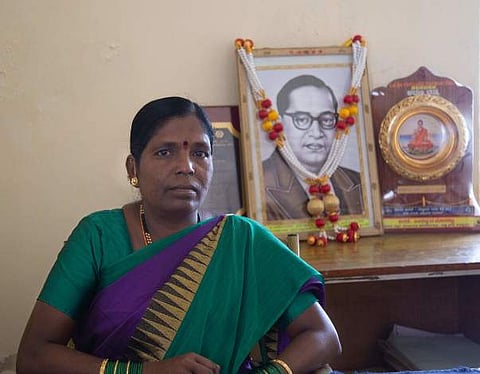

Remember how as school children we waited for that last bell to ring every day? For us, that was the most blissful sound on Earth. We couldn't wait to rush out of there to go to our own happy place — home! But that wasn't the case for Sitavva Jodatti, who is one of this year's Padma Shri awardees. For her, there was nothing happy about home. "When I think about my childhood at home, I can’t really think of anything that made me happy. But I used to go to school and that is where I was my happiest, especially while playing sports. I loved playing kho kho. I also loved running track and high jump. My school was my happy place. Going back home only meant going back to all the pain and struggle," she tells us. "When I see children even today going to school and see them in their uniforms, it makes me very happy. It reminds me of the little joy I had as a child!" she exclaims.
But what made her so unhappy at home? At the age of seven, Sitavva was pushed into the age old Devadasi system, a practice that existed in Northern Karnataka, where young girls were sold for money to older men in the pretext of them being dedicated to Goddess Yellamma. Sitavva often saw women dressed up in pretty clothes going to 'work' and she grew up to believe that it was all normal. "It was only later that I realised that this is not the only life for a girl child. I was very young when it began. I was a seventh grader when I had to start going to ‘work’. My father fell ill and our family could not have sustained if I did not go. Every time I had holidays and even on weekends, I would have to go to 'work'," she recalls.
Sitavva was initially sold to an older man with whom she bore two children. Later, she was sold to someone else by her family. But for a 12-year-old, it took her longer to understand the complexities of the system and to realise that she had actually been sold. "I was initially very happy about dressing up in those beautiful clothes because I thought that that was all it would be — dressing up. I didn’t know I was being sold to somebody. I didn’t know there was something wrong with it. All I knew was that I suddenly didn’t like it anymore. It took me a long time to realise that I had actually been ‘sold’," says Sitavva. She missed her happy place and all the memories connected to it. But she knew that she could never have them back and that her family wouldn't be able to take care of her, if she'd gone back. Grudgingly, she decided to accept her fate.
But Sitavva was a determined young woman. She knew that she had to make a change in the society and ensure that no other child in the future falls prey to this system and loses their childhood. There was hope too. After the government abolished the Devadasi system, Sitavva was a regular in self-help group meetings for Devadasi women in Chikkodi. With all the knowledge and expertise, she started Mahila Abhivrudhi Mattu Samrakshana Samsthe (MASS) in 1997 to empower Devadasis and their children.
"I don’t want any child to go through what I went through. I realised that when children are educated and are able to complete their education, that’s when they find happiness and can lead a respected life. Education empowers us in so many ways. I knew this system had to stop and we have to stop it at the root of the problem. Such beliefs can do little to cripple people who are educated," she says. Today, MASS has 17 permanent staff members, 55 part-time volunteers and over 3,000 members. They also run multiple programmes for Devadasis, as well as provide education of their children. She also runs a fundraiser to raise more money to empower more women and to eliminate this evil.
But it isn't a cakewalk and Sitavva is aware of it. "Even today, when we go as a group to events, sometimes, people get very violent. They look at us as people who are disturbing the integral convenience that keeps their life going and the comfort of following what has been taught to them. They come to beat us and sometimes even carry stones with them. This is the biggest hurdle we’ve faced — the lack of awareness among people and the blatant refusal to look beyond the limitations of what they have been taught to preserve," she says, adding, "They look at us like we’re the ones who are wrong. It’s difficult to break that thought process and tell them otherwise. It will take time and a lot of effort, but we have come a long way and I am sure it’ll happen. People are slowly becoming more aware now. The government and many organisations are also helping us with this."
So what is the next milestone for Sitavva? She tells us, "Now, we want to ensure that the Devadasis' children don’t drop out of school. That is the biggest thing that must stop. We want to make sure that they complete their education and explore other ways to make a living for themselves. We want to spread awareness about the plight of women and children who are forced into this system and the importance of education to break away from it. We wish to help in educating these children. We will continue to spread awareness to the people and ensure that their thought process changes."
You can contribute to the campaign here: milaap.org/fundraisers/
